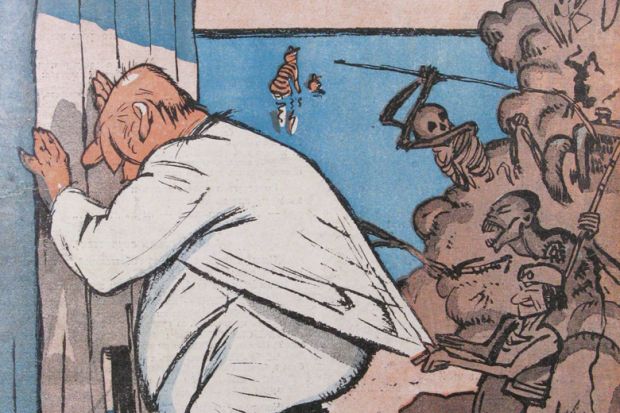Laughter is a release, an anaesthetic, cohesive, corrective, and – in wartime – the sound of defiance and despair. Laughter and War is the first detailed look at how four satirical magazines – English, French, German and Russian – used humour to share the trauma of the First World War, and it is a solid achievement of historical recovery that focuses on the ordinary rather than the elite reader.
The British examples, from Punch, are in the tradition of anti-German diatribes in the British press dating from the 1880s, expressing fears of an invasion that never came. But where Punch used whimsy and wordplay to confuse and ridicule the enemy, the French La Rire was more daring and less coy, with cartoons of naked ladies and scatological poilus. The German Simplicissimus laughed in challenge to the whole world, with special ire for “English” ignorance of kultur. Russia’s Novy Satirikon expressed the defiant jibes of the liberal intelligentsia, barred from the army for their bourgeois views. As well as the enemy, all four magazines criticised their own politicians, along with shirkers, pacifists, military censors and the clueless privileged classes, as skewered by Ina Garvey’s superlative “Blanche” columns in Punch.
There are many small delights in Lesley Milne’s book, of fine satirical material to gladden the connoisseur’s heart. Punch took the lead in joyfully ridiculing the German policy of Schrecklichkeit (“frightfulness”), as only deflationary English can: “As an example of ‘frightfulness’ nothing can exceed the appearance of one of our really mixed platoons lying on its backs and waving its legs in the air.” I particularly enjoyed Milne’s detailed discussion of how the French soldiers, and their wives or temporary “marraines”, were cheered on for supporting the national birth rate (“Stay for another six days, dearest, you can say you wanted twins”).
The verbal and visual techniques of cross-cultural disparagement are truly fascinating, as are the different welcomes given to the arrival of the US into the war in 1917. Milne reveals that the author of a sardonic set of verses mocking Woodrow Wilson in Punch had lost his 15-month-old daughter in the sinking of the RMS Lusitania.
Milne’s translations are impressive, since (with German and French assistance, and her own knowledge of Russian) she creates perfect English versions of French satirical chansons worthy of W. S. Gilbert for polish and rhyme. She rewrites an encounter in Simplicissimus between Lords Nelson and Kitchener in blank verse, and a Russian parody of Pushkin in the style of Betjeman.
Since much of the humour is drenched in vitriol, the magazines offered a reading diet of continual negativity below the wit. Punch and La Rire lost many soldier contributors in action. When the British cut the deep-sea cable connecting Germany to North America in September 1914, Simplicissimus was outraged, printing what Milne calls “a magnificently venomous drawing of a toad spewing snakes” to represent the lies Britain was now telling the world unchecked. By 1916, Punch was making jokes about bread riots in Berlin. The verbal snapshots, jokes, sketches, cartoons, caricatures and comic verse from all four nations are undeniably witty, but now feel desperately sad.
Kate Macdonald is visiting fellow in the department of English literature and language, University of Reading.
Laughter and War: Humorous-Satirical Magazines in Britain, France, Germany and Russia, 1914-1918
By Lesley Milne
Cambridge Scholars Publishing, 292pp, £47.99
ISBN 9781443886864
Published 1 February 2016
Register to continue
Why register?
- Registration is free and only takes a moment
- Once registered, you can read 3 articles a month
- Sign up for our newsletter
Subscribe
Or subscribe for unlimited access to:
- Unlimited access to news, views, insights & reviews
- Digital editions
- Digital access to THE’s university and college rankings analysis
Already registered or a current subscriber? Login




